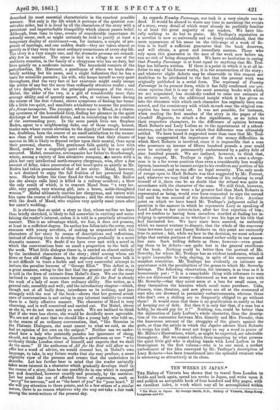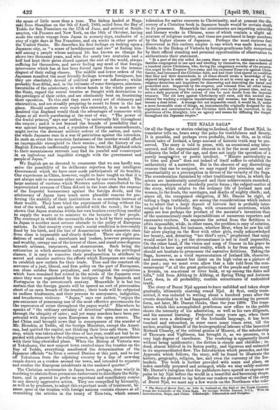TEN WEEKS IN JAPAN.* Tan Bishop of Victoria has shown
that to travel from London to Yeddo and back again, spend ten weeks in Japan, and write upon it and publish an acceptable book of four hundred and fifty pages, with an excellent index, is work which may all be accomplished within
• Ten Weeks in Japan. By George Smith, D.D., Bishop of Victoria, Hong-Kong Longman and Co. tie space of little more than a year. The bishop landed at Naga- saki from Shaughae on the 9th of April, 1860, sailed from the Bay of Yeddo for San Francisco on the 17th of June, and arrived at South. ampton, via Panama and New York, on the 16th of October, having made the entire voyage from Japan in seventy days, exclusive of a stay of eight days at San Francisco, and six weeks in other parts of the United States. He describes his first feelings on looking upon a Japanese city, as "a sense of bewilderment and awe" at finding him- self among a people whose national life has known no change for above two thousand years, and who for nearly two centuries and a half had kept their gates closed against the rest of the world, always sufficing for themselves, and never feeling any need of that foreign intercourse which has at last been forced upon them to the intense disgust of their ruling classes. The middle and lower orders of the Japanese manifest the most friendly feelings towards foreigners, but they are absolutely devoid of political power or influence; whilst probably four-fifths, and, in the estimate of some foreigners, nineteen. twentieths of the aristocracy, in whose hands is the whole power of the State, regard the recent treaties as fraught with destruction to the privileges of their order, and are obstinately bent on frustrating their operation. To this end they exert every art of chicanery and obstruction, and are steadily preparing to resort to force in the last place. Should matters ever reach this extremity, it is much to be doubted that England would think the advantages of commerce with .Japan at all worth purchasing at the cost of war. "The power of the feudal princes," says our author, "is universally felt throughout the empire ; and it is not beyond the bounds of possibility that a war against foreigners, and a repulsion of European encroachments, might revive the dormant military ardour of the nation, and unite the whole Japanese race in a war of patriotism a,gairist the intruders. In such an event the mountain fastnesses of the interior would afford an impregnable stronghold to their armies ; and the history of our iglish Edwards ineffectually pursuing the Scottish Highland rebels to their mountainous retreats may find its parallel and counterpart is an inglorious and impolitic struggle with the government and people of Japan."
We English are so devoted to commerce that we can hardly eon- oeive the possibility of its deliberate rejection by any intelligent Government which we have once made participators of its benefits. Our experience in China, however, ought to have taught us that it is not always tafeto measure other men's corn by our own bushel. The large amount of customs which Western nations contributed to the impoverished revenue of China did not in the least abate the rancour of the Imperial bureaucracy against the foreign devils, and the aristocracy of Japan have much more plausible reasons for pre- ferring the stability of their institutions to an uncertain increase of their wealth. They have tried the experiment of living without the rest of the world, and are quite satisfied with the result; for it has shown that Japan contains within her own borders everything needful to supply the wants or to minister to the luxuries of her people. The contempt in which the mercantile class is held by their superiors in Japan is another most serious obstacle to the policy of European nations. In that country every man's social condition is irrevocably fixed by his lirth, and the line of demarcation which separates class from class is impassable and clearly defined. There are eight gra- dations of social rank ; merchants and traders, however prosperous and wealthy, occupy one of the lowest of these, and stand some degrees beneath artisans, carpenters, and stonemasons. Such being the estimation in which mercantile enterprise is held by the privileged classes, it is easy to conceive their predisposition to attribute to secret and sinister motives the efforts which Europeans are making to establish new outlets for their trade. Time and the constant ob- servance of a just, liberal, and firm policy on the part of Europeans, can alone subdue these prejudices, and extinguish the suspicions which have remained fast rooted in the minds of the Japanese ever since they were engendered by the intrigues of the Spaniards and Portuguese in the seventeenth century. Meanwhile it is but too certain that the foreign guests will be spared no sort of provocation short of an open breach of the treaties ; their trade will be subjected to endless hindrances, and their persons to annoyances, indignities, and treacherous violence. " Japan," says our author, "enjoys the pre-eminence of possessing one of the most effective governments for the repression of crime throughout the pagan world." Elsewhere he
s of "the ordinary certainty of detection" attendant on crime
speaks the ubiquity of spies; and yet many murders have been petrated with impunity upon Europeans in the open streets. The last China mail brought news that in consequence of the murder of Mr. Henskin, at Yeddo, all the foreign Ministers, except the Ameri- can, had quitted the capital, not thinking their lives safe there. This step, which was taken about the close of last year, could not but be re- garded with pleasure by the ruling powers, as 'being in exact accordance with their long-cherished plans. When the Bishop of Victoria was at Yokuhama, the new seaport town erected since the treaties on the Bay of Yeddo, everything manifested the determination of the Japanese officials "to form a second Desima at this port, and to cut off Yokuhama from the adjoining country by a line of new-dng canals drawn as a cordon around the town, and intended to separate and confine the European inhabitants in the enclosed quarter."
The Christian missionaries in Japan have, perhaps, done wisely in resolving to abstain from premature endeavours to distribute the Scrip- tures, and in general to prefer an expectant and conciliatory course to any directly aggressive action. They are compelled by humanity, as well as by prudence, to adopt this expectant mode of treatment, be- cause none of the treaties with foreign nations contain clauses at all resembling the articles in the treaty of Tien-tsin, which secure
toleration for native converts to Christianity, and at present the dis- covery of a Christian book in Japanese hands would be certain death to its possessor. Meanwhile the missionaries are importing scientific and literary works in Chinese, some of which contain a slight ad- mixture of religions matter, and these are purchased in large numbers by the hioaher classes of Japanese. Perhaps the most curious fact discovered in this curious empire is one which was made known at Yeddo to the Bishop of Victoria by foreign gentlemen fully competent by their official standing and personal opportunities of observation to authenticate their statement.
" In a part of the city called Ao-yarna there are now in existence a hundred families congregated in one spot and dwelling by themselves, the descendants of a hundred native Christians, who, daring the sanguinary severity of the persecu- tion urged by the Emperor Tyco-sama and his successor Eyay-yes against Chris.. tianity, had renounced the Christian faith, and had their lives spared on condition that they and their descendants in all times should retain a knowledge of the abjured religion in order to qualify themselves to act in every age as a body of religious detectives and inquisitors for discovering and destroying the hated and proscribed sect. Supported by the emperor, and released from all other labour for their subsistence, they form a separate body even to the present time, and re- ceive a daily payment of five rations of rice for each family from the imperial treasury. The old laws against Christianity still exist, and this ancient ma- chinery for working a religions inquisitonship still remains; but they may have become a dead letter. A strange but not impossible result it would be, if, under a more favourable state of things, an instrumentality originally designed for the repression and extermination of the Christian faith should be converted, in the providence of the Almighty, into an agency and means for diffusing the Gospel throughout the Japanese empire."































 Previous page
Previous page